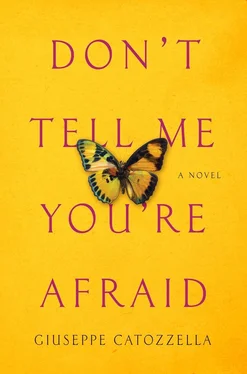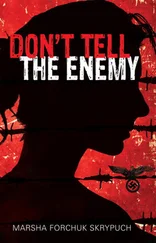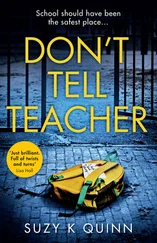The backup driver went over to him and gave him a loud smack. The man fell to the ground. His glasses broke, cracked in half. Struggling to get up with the two broken pieces in his hand, he kept it up: “You’re disgusting. Filthy two-bit scammers.” The trafficker kicked him in the calf and made him fall again. “Shut up, hawaian, ” he told him. Animal.
And that was that.
We were in their hands.
They knew it; they’d learned how to tell when a man turns into a needy refugee . They read it in your eyes. It’s something that shows. Plain as the rising sun, clear as flowing water. It’s something you carry with you, written in your eyes. You can try all you want to hide it, but you’ll never be able to. It’s the smell of a downtrodden animal.
There, for the first time, we were called animals. When you enter the desert, you stop being a human being. I had been a tahrib in Addis Ababa, but now I was a needy tahrib refugee. A vulnerable illegal. An animal tethered to life by an ever-more-tenuous thread.
They beat you.
If you don’t have the money, they beat you.
If you don’t obey orders, they beat you.
If you dare to respond, they beat you.
If you ask for more water, they beat you. They don’t care if you’re a man or a woman, an adult or a child: They beat you.
If you protest, they bring you to the police.
And there you have only two options. Pay the police to be handed over to other traffickers, or let them take you back to the border with Ethiopia.
Early in the Journey you learn to keep silent and pray.
Early in the Journey you learn to forget why you’re there and to practice silence and prayer.
For ten days I stayed in Sharif al Amin, in that brick house that was actually a prison with bars on the windows. Two liters of water every twenty-four hours, and two servings of food. A mattress on the floor in quarters for thirty people.
To get to Khartoum, another two hundred dollars were needed.
I had almost run out of money.
On the third day I called Hodan in Finland and revealed that I had left. She thought I was still in Addis Ababa; I hadn’t wanted to tell anyone. I had only one minute’s time, not a second more. She knew. That’s what the traffickers allow you on their satellite phones. A minute doesn’t seem like very much, but in that situation it becomes timeless. In a minute you can say everything you need. You learn that a minute can save your life. That’s all you need.
Hodan wasn’t expecting me; speaking in rapid-fire bursts she told me to be careful, to try to become friendly with the Somalis, to always stay in a group, never to go off on my own, to do as the others did so I wouldn’t stand out. Suddenly my brain started functioning again; I took in everything she said.
She asked me where I was and I told her.
She hadn’t been there; she didn’t know the place. Her Journey had taken a different route.
I told her I needed money to continue, that I had used up what I had, and that I didn’t want to call Hooyo or Said; I didn’t want them to worry. I would call them from Italy once I got there.
I told her where to send the money.
Before ending the call she reminded me not to be afraid.
“Never say you’re afraid, Samia.”
“Okay, abaayo .”
Never.
It was what I used to tell her during her Journey.
But everything was different now. I was afraid; I was very afraid. Frayed. I felt frayed. Like the worn photo of Mo Farah stuffed in my bag; I felt as fragile as butterfly wings. As insubstantial as a cloud. Poof .
What a lot of things you can say in a minute. A lot.
The money from Hodan arrived after eight days, and two nights later I resumed the Journey.

WHEN I GOT TO KHARTOUM, I knew I had to rest up and recoup my strength for the hardest part, crossing the Sahara.
I was shattered. I was a memory of myself, not a presence, a slender thread of memories and scattered images. That’s all I was.
I stayed in a tiny apartment on the outskirts south of the city for six weeks, along with thirty other women. A month and a half. All we did was sleep and take turns going out to buy food at the market or in a store a short distance from the house. We were tahrib; we had to be careful. We crept around like tahrib . We were shifty-eyed like tahrib . We looked like paranoid, frantic mice, always on guard. In danger of being sent back to where we’d started.
I had to call Hodan again and have her send me another five hundred dollars for a leg of the trip that was supposed to get me to Tripoli. Reluctantly, I was having her give me back Alì’s money that I had sent her for Mannaar. But things had changed. Mannaar came to me in my dreams and no longer in my waking thoughts. Awake, all I thought of was staying alive.
And no one had told me that the Journey would be so expensive.
I knew they wouldn’t take us to Tripoli, that they would leave us someplace else. But I had learned. If I didn’t want fear to get the better of me, what I had to do was not think about it.
I spent forty days stuck in that apartment in a six-story building on the ugly outskirts of Khartoum. There were only two windows, and all you could see was the concrete facades of other dilapidated buildings like ours. Flaking walls and decrepit balconies. In the distance, as far as you could see, a patch of desert could be glimpsed between two buildings.
Golden.
The heat was asphyxiating. And there were thirty-one women and three children in very cramped quarters. I spent the first ten days lying on the ground on a mat.
I didn’t even have enough air to dream.
Then I made a mistake.
In spite of everything, maybe I still felt like I was invulnerable, invincible, the Samia I’d always been. True, I had effaced myself and struggled to even remember who I was; memories flashed by only when they chose to. But maybe what we are deep inside can’t be effaced. Maybe that’s how it is, and we end up recognizing who we are only through what we do. Anyway, Ayana, a Somali girl, warned me not to do it. But the water was all used up, and we were waiting for the sun to go down to go out and buy some containers. I was parched. That night I’d sweated so profusely that the moisture had drenched my clothes and soaked through to the hard mat. I drank tap water from the bathroom. Within three hours I began to feel strong shudders running down my back, along my arms and legs, everywhere. Cold sweats. Then nausea and hallucinations. I was gripped by a fever I’d never experienced before. And dysentery. Since I’d left, I hadn’t eaten much. The muscles I had developed with Eshetu were slowly wasting away. I could see for myself. The dysentery was the final blow.
I spent twenty days on the mat in a comatose state. Ayana comforted me. She remained healthy while others fell ill as I did. If it wasn’t the water, it could be an unwashed fruit. Or a fruit rinsed with that same water. Or some rotten fish.
I should have left sooner, but I waited to get my strength back. Ayana had no one to call in Europe for money, so she would remain in that house much longer than I. She’d almost begun to think of it as home.
Then, finally, I was well again. I’d recovered my strength. At least as much as I needed.
They squeezed us all in, only this time there were even more of us than the first time. Eighty-six. So packed in that we gagged for lack of air. Once again a jeep.
After a few kilometers no one spoke anymore, no one complained, no one even thought of singing. The stretch through the desert is much tougher. The heat is so intense you could die, and besides that, the vehicle proceeds more slowly, maintaining a constant low speed. It doesn’t brake or accelerate, so as not to get stuck in the sand. Everything is grueling, even breathing. It’s like crawling along on an endless road at a snail’s pace. As you move ahead, you can see the road lengthen rather than shorten.
Читать дальше





![Ally Carter - [Gallagher Girls 01] I'd Tell You I Love You But Then I'd Have to Kill You](/books/262179/ally-carter-gallagher-girls-01-i-d-tell-you-i-lo-thumb.webp)







